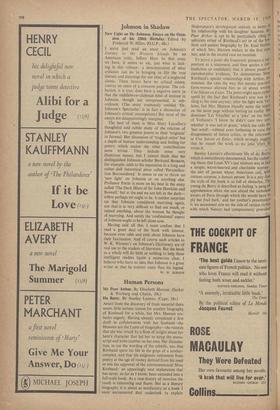Johnson in Shadow
New Light on Dr. Johnson. Essays on the Occa- sion of his 250th Birthday. Edited by Frederick W. Hilles. (O.U.P., 48s.) I HAVE just read an essay on Johnson's Journey to the Western Islands by an American critic, Jeffrey Hart. In that essay we have, it seems to me, just what is lack- ing in this volume: a demonstration of what criticism can do in bringing to life the true themes, and meanings for our time, of a neglected classic. These essays have no critical centre, convey no sense of a common purpose. The col- lection, it is true, does have a negative merit in that the middlebrow-clubman kind of interest .in Johnson, though not unrepresented, is sub- ordinate. (The- essay ominously entitled 'Dr. Johnson's Spectacles' is in fact a discussion of Johnson's critical 'assumptions.) But most of the essays are disappointingly marginal.
The best of them is Miss Mary Lascelles's: thoughtful and subtle study of the relation of Johnson's two greatest poems to their 'originals' in Juvenal. Her discussion of 'tragical satire' has a depth of human understanding and feeling for poetry which makes the other contributions seem trivial. They include some very illustrious names, but I cannot think that the distinguished Johnson scholar Bertrand Bronson, for example, adds to his reputation in a long and rather dull theoretical piece called 'Personifica- tion Reconsidered.' It seems to me to throw no 'new light' on Johnson or on anything else. Professor Pottle is more on his beat in the essay called 'The Dark Hints of Sir John Hawkins and Boswell,' but at the end we are left in the dark- wlfere perhaps we ought to be. It neither surprises me that Johnson considered marrying again, nor that it is very difficult to find out much, or indeed anything, about the woman he thought of marrying. And surely the 'confessional' aspect of Johnson ought to be left alone now.
Having said all this, I must confess that I read a great deal of the book with interest, because even odds and ends about Johnson have their fascination. And of course such articles as W. K. Wimsatt's on Johnson's Dictionary are of real use to the student of literature. But the book as a whole will do little or nothing to help those intelligent readers (quite a numerous class, I believe) who have no idea that Johnson is a great writer or that he matters more than his legend.
W. W. ROBSON


































 Previous page
Previous page